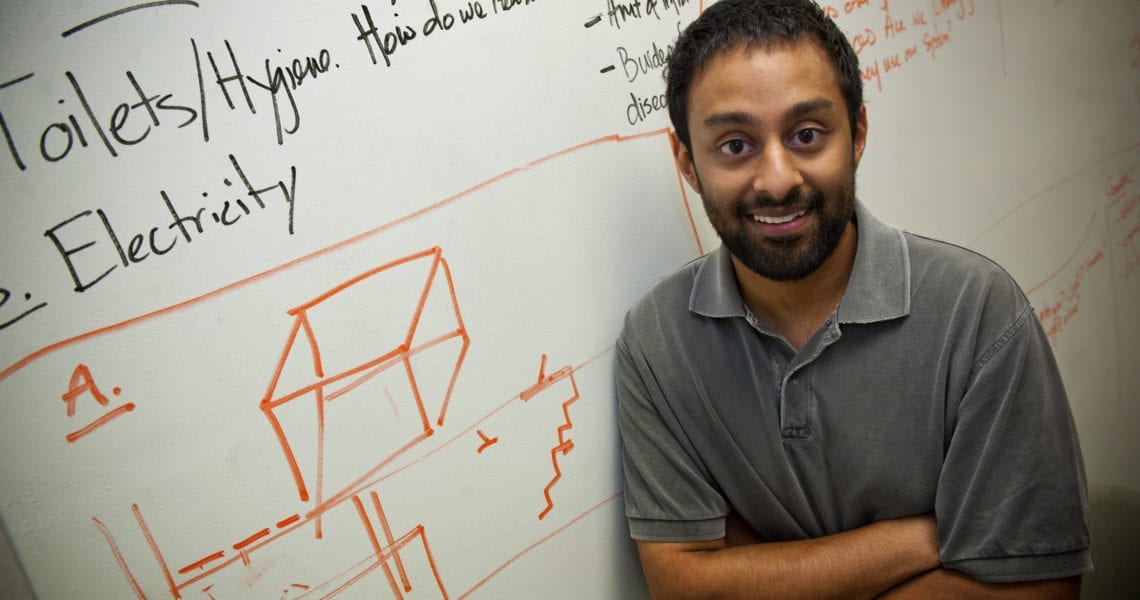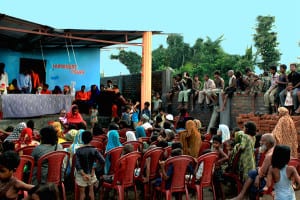
Changemaker Institute Graduate Anoop Jain visits Changemaker RLC
“There’s a lot of value in understanding how we go about creating change… I think it’s really important to remember that change can be something that is as little as moving a grain of sand.”
Changemaker Institute alum, Anoop Jain began his roundtable with the Changemaker RLC, on October 3rd, reminding attendees of this simple fact. Recounting his life’s story as a social entrepreneur, Jain encouraged Paterson residents to seek out their changemaker path and not be daunted by the size of the problems they wish to tackle.

Jain is the founder and director of Sanitation and Health Rights in India (SHRI), an organization that builds toilet facilities in India to decrease open defecation and the spread of disease. Selected as a Forbes 30 Under 30 socialentrepreneur and an Echoing Green fellow, Jain has been working with SHRI since 2011 to serve the 650 million Indians who do not have access to a toilet.
Describing his journey towards starting SHRI, Jain began his roundtable with Hurricane Katrina. While attending high school in New Orleans, Katrina struck and Jain was forced to evacuate to Houston.
“That’s the first time in my life that I fully grasped that poverty and tragedy are often manmade, they’re not just these random occurrences, not something that spontaneously comes out of air…,” Jain said.
Jain felt that marginalized communities were disproportionately affected by the disaster and that the storm only reaped the damage it did because of the institutionalized poverty in New Orleans. Over the following summers, he would return to the city to gut houses in the Lower Ninth Ward, working with other volunteers to clear the wreckage of the storm.

“This experience, this was like a drug to me… I became addicted to this life of working in fellowship with like-minded people to affect change. I can’t really describe to you what that meant to me,” Jain said.
After finishing his undergraduate degree at Northwestern University, Jain accepted a job with an engineering firm in Chicago but felt unsatisfied. He ended up lying to his boss and coming back to New Orleans for stretches of time to gut more houses. Additionally, Jain was working on a project to raise money to open a soup kitchen for Tibetan refugees in India. Eventually, he reached his goal of $30,000 and quit his job to travel to India.
Jain was deeply affected by his time in India.
“At that time, I was getting closer to what I wanted to do, which was some form of social justice work, and I wanted it to be in India, but I still fully didn’t know what that looked like for me,” Jain said.
Speaking with community activists in 2010, Jain came across the region of Bihar, where there is no running water and residents can use electricity for two hours a day. He learned more about the public health crisis of public defecation. In India, 45% of the country defecates in the open, whereas in Bihar is is 80%.
The 100,000 tons of human feces left out in the open every day causes water and food contamination and illness. Diarrhea, a product of open defecation, is a greater killer of kids under 5 than malaria, TB, and HIV combined.
“There are very very smart people who continue to blame the issue of open defecation on culture, religion, and individuals as though it’s a choice borne out of cultural preference or some religious doctrine,” Jain said. “As an Indian that’s racist and classist…”

Tulane and Changemaker Institute alum, Anoop Jain’s social venture, Humanure Power, which builds community blocks of toilets accessible to 650 million Indians without access to a toilet. Methan gas is used to generate electricity that charges batteries, which are rented to 400 million Indians living without electricity, creating a sustainable model
Jain tried to start sanitation-related work in 2010 and went into business with a promising partner. After they were awarded funding, the partner stole all the money and ran, leaving Jain demoralized and defeated. He moved back to New Orleans, at the suggestion of his parents, and started his master’s in public health at Tulane.
While at Tulane, Jain entered the Taylor Center’s Changemaker Institute with the social venture idea of creating community toilets in India to decrease public defecation. The toilets would be free to use by public, placed in dense areas, and the waste would be stored in a biogas tank where it would decompose into methane gas and be used as electricity to power water filtration plants. The team entered the Dell Social Innovation project with low hopes and quickly advanced beyond their wildest expectations.
“I will never forget when we found it we made it to the top 5 and there were 1700 initial applicants… it was just bonkers, I had literally gone in the space of ten months, from… I don’t think I’m ever going to do anything sanitation-related again to being in the top five of this international competition for funding,” Jain said.
The team came in second place and won $30,000 in funding. After two years of planning they built their first toilet. After being awarded honors like Forbes 30 Under 30 social entrepreneur and an Echoing Green Fellowship, Jain felt that the work of the team was not being celebrated for their accomplishments and efforts.
He recounted a story of a Muslim worker, toiling to build a facility in 120-degree weather, and was fasting due to his celebration of Ramadan. Jain approached him and urged him to eat or drink and the man assured him that he would be fine because he was doing god’s work.
“I think what gets overlooked too much is the strength and capacity of the communities that we work with,” Jain said. “That’s very rarely talked about.”
Today, Jain oversees 4 facilities which serve between 5,000 and 6,000 people every day. SHRI has 40 full-time employees and Jain is looking to expand even more. He is trying to work with the government to fund more facilities but has difficulty wading through the country’s corruption and lack of care for the issue.
“That’s why sanitation, in my opinion, is a manmade disaster and crisis in India,” Jain said. “You see flawed policy, you see neglect of low-caste Indians, you see neglect for rural areas, you see all of this structural neglect and violence, and it manifests itself as disease.”
The Tulane graduate reflected on when he thought he had lost the Dell competition and cursed loudly in the hallway. The judge approached him after and told him that in that moment he knew that Jain’s team deserved the prize money because it was clear they cared deeply about their work.
“I think there’s this temptation for people to hide their emotions… and I just don’t believe in that,” Jain said. “I think that people should really care about what they do in the deepest possible way and I think that that reflects in your work, it reflects in how you carry yourself and people are moved by that.”